SPOR OB BOSPORJU
Prejšnji teden smo v oddaji govorili o protestih in demonstracijah profesorskih kadrov v Veliki Britaniji, danes pa se bomo podrobneje spoznali s situacijami, s katerimi se soočajo turški študentje na eni izmed akademsko najprestižnejših turških univerz, univerzi Boğaziçi na evropski strani bosporske ožine v Istanbulu. Konec marca 2018 je namreč na kampusu skupina nacionalističnih študentov mimoidočim delila lokum v spomin na umrle turške vojake v vojaški operaciji Oljčna vejica. Temu se je uprla skupina levičarskih študentov, ki jih je tajna policija v naslednjih dneh v več ločenih operacijah aretirala in obdolžila širjenja teroristične propagande. Za lažje razumevanje konflikta bomo skušali osvetliti nastanek in razvoj univerze, razlike med akademskim delovanjem pred in po leta 2016 spodletelem vojaškem udaru ter povzeli nekaj ključnih dogodkov, ki so vodili do marčevskih aretacij študentov na kampusu. Pri tem nam bo pomagal Mehmet, absolvent ene izmed fakultet na omenjeni univerzi.
Ustanovljena leta 1863 kot Robert College, prva ameriška institucija za visoko izobraževanje izven meja ZDA, je bila sprva namenjena študentom krščanskih manjšin in tujcem, živečim v Istanbulu. V dogovoru z Abdülmecidom I. tedanjim reformističnim sultanom Otomanskega imperija, je administracija leta 1870 na hribu ob Bosporski ožini postavila prvi kampus z imenom Bebek. Robert College je po ameriškem univerzitetnem modelu in pod ameriško administracijo deloval do leta 1970. Po drugem vojaškem udaru turške republike leta 1971 je bilo vodstvo in upravljanje kampusa Bebek predano turškim oblastem in univerza je dobila ime ki ga nosi še danes, v turščini dobesedno “Bospor”. Ustanovitelji so zagovarjali načela enakosti in enakovrednosti študentov ne glede na etnično pripadnost ali veroizpoved in liberalna atmosfera ter akademska svoboda sta se bolj ali manj ohranili tudi v prihodnjem desetletju kemalistične vladavine.
Slabih deset let precej liberalne in sekularne akademske atmosfere je po uspelem puču leta 1980 zamenjalo obdobje, ko je vojaška hunta spremenila ustavo v smeri povezovanja države z religijo, sunitski islam pa je postajal vse večji del javnega življenja, tudi univerzitetnega, kjer je verouk vladajoče religije postal obvezni predmet. Z namenom nadzora nad avtonomnimi univerzami so vladajoči takrat ustanovili Svet za visoko šolstvo, ki je pomembno vplival na akademsko svobodo, o čemer je septembra lani obširneje pisala Nina Korošec ("Spet v Turčiji"). Člane tega izvršilnega telesa, ki imenuje in izvoli dekane fakultet, od leta 2004 dalje imenuje predsednik republike Recep Tayip Erdoğan. Od ustavnega referenduma leta 2010 dalje pa je v njegovi pristojnosti prav tako imenovanje rektorjev univerz. Vzpon Erdoğanove Stranke za pravičnost in razvoj, v turščini krajše AKP, je javnost v Turčiji na začetku pozdravila, saj je bila po strogem militarističnem obdobju znanilka progresivnejše politike na področju religije ("Država je Erdoğan"). Na javnih univerzah je odpravila sekularistične prepovedi nošenja pokrival za ženske in omogočila javno izražanje veroizpovedi akademskih delavcev in študentov po načelih tolerance (“Turški revanš”). Kljub temu Mehmet meni, da se je z vladavino AKP prej kemalistični nadzor civilne države nad dominantno religijo obrnil v še močnejšo promocijo državno odobrenega sunitskega islama v javnem izobraževanju.
Education policies of the AKP government are such, Erdoğan doesn't say this openly, they want religious generation. They don't want a secular generation or generation that is critical. They just want to create a different generation, different understanding of youth. Which is nationalist, sacrifices themselves for the interest of the nation. They don't want University which has international ties, which is open minded and critical about the government.
Hkrati pa je vladajoča oblast z revizionističnimi učnimi načrti spodbudila razraščanje antiintelektualizma. Ti v javnem izobraževanju predvidevajo izpustitev celih poglavij zgodovine nastanka turške republike ali pa jih prilagajajo v okvire “perspektiv nacionalne in moralne vzgoje”.
In this authoritarian trend actually they don't find any institution to oppose them. It is also very much related to anti-intellectualism - anti-intellectual behavior of the government. This is mostly the case in all populist governments, let it be communist, conservative, Islamist. Mostly this populist governments have anti-intellectual stand point, our government also has one.
Univerza Boğaziçi je vladajoči APK zaradi svoje liberalne pozicije in opozicijske drže dominantni politiki kmalu postala trn v peti. Kot poudarja Mehmet predvsem zaradi kontinuirane produkcije ter distribucije kritične misli.
In the eyes of the conservative and religious rightist person like the president, actually our University is considered as infidel university, which so not related enough to national, patriot values of Turkish nation. We are considered as something not "native" to this country, something Western, perverted, immoral. [In the past, op.a.] Boğaziçi was considered an oasis within Istanbul. We had freedom, we could drink alcohol at the campus. In most other Turkish universities you can't consume alcohol, it's prohibited. In Boğaziçi we were enjoying this freedom, because it was considered a safe zone.
Situacija se je še bolj drastično spremenila po spodletelem bombnem napadu na parkirišču kampusa univerze februarja 2016, ko naj bi policija v avtomobilu odkrila eksplozivno telo. Sledile so aretacije zaposlenega v administraciji in študentke filozofije Sinem Ögüz, kasneje pa še petih kurdskih študentov, obdolženih simpatiziranja s prepovedano Kurdsko delavsko stranko, krajše PKK. Mit o varnosti in svobodi najbolj liberalne turške univerze se je počasi začel razkrajati.
As far as I remember there was only one arrest related to car issue, a philosophy student who got arrested. And the professor from psychology department got arrested also. After those arrests the myth about Boğaziçi [as a safe zone, op.a.] started to collapse.
Po spodletelem državnem udaru junija 2016 je oblast sprožila obsežno čistko med akademiki, novinarji in pravniki na podlagi obtožb o sodelovanju ali simpatiziranju z gibanjem Fetullaha Güllena. Temu je sledil množični intelektualni eksodus in aretacije predvsem tistih, ki so bili v svojem učnem procesu kritični do oblasti. AKP je razglasila izredne razmere in si s prej omenjenimi spremembami visokošolske zakonodaje glede imenovanja rektorja in kadrovanja v administraciji zagotovila notranji nadzor nad delovanjem univerz. V ta namen je na podelitvi diplom imenovala novega, pravičnosti in razvoju naklonjenega rektorja univerze Boğaziçi prof. Mehmeda Özkana. Eden njegovih prvih dekretov je bila sprememba pravilnika, po katerem so lahko dotedanji in novoustanovljeni študentski klubi sredstva za svoje delovanje pridobivali s strani političnih strank. Pri tem je po mnenju Mehmeta najbolj profitiral novoustanovljeni študentski klub Boğaziçi University Islamic Research Club, krajše BISAK, h kateremu se bomo vrnili malo kasneje.
They wanted to appoint the rector with more conservative background and tendencies who also participated in some events of the pro-government student club. So he provided them some space in the University, he directly participated in the panel where they have invited a spokesperson of the president. Actually we see a very open relationship between the rector and this BISAK student club.
Oblasti všečna administracija je začela intenzivno preprečevati kritične dogodke drugih bolj progresivnih študentskih klubov. Njegovim znancem je bilo tako ob posredovanju rektorja in predstavnikov koalicijske stranke Nacionalistično gibanje, krajše MHP, preprečeno izvesti razpravo o priprtih urednicah dnevnika Özgür Gündem. Eren Keskin in Reyhan Çapana so namreč ravno pred tremi tedni obsodili na sedem in pol let zapora zaradi “poniževanja turškosti, državnih organov in institucij” oz. kritičnega poročanja o turških vojaških operacijah v Kurdistanu. Hkrati se kritičnemu govoru o dnevni in državni politiki izogibajo tudi profesorji v predavalnicah. Še posebej po kampanji Akademiki za mir, zaradi katere je mnogo predavateljev izgubilo službo ali pa so jih celo zaprli.
Now actually all professors of mine are trying to avoid talking about daily politics. They cannot talk about the president, about something concrete about Turkish politics. Before there was a more liberal environment. They were talking freely, not so heavily, but they were giving some references. Sometimes they were using the governing party and the president as an example for some concepts. But now they cannot talk. Actually one professor from the psychology department, she was in jail for six months. This is related to the Kurdish issue. After the 7th of June elections in 2015, AKP lost a lot of seats in the pairlament, so they offered the war against Kurds to provoke some national sentiments. Some professors came together and they made a declaration for peace. After this event, after the declaration, a professor got arrested and sent to jail and she was there for 3 or 4 months, in jail for propaganda of terrorism, cliché in Turkish politics now.
Od nastopa novega rektorja so na predavanjih in seminarjih pogosto prisotne tudi tajne policijske enote v civilu.
This undercover police, secret police, they also enter the classes like students. So [professors, op.a.] are very much afraid of this. We talked with some professors of mine and they are afraid of being recorded, so they cannot talk freely in the classes. They always have to look at the faces for example: "If I know this guy, if I don't know." So they have to check if there's secret police in the class. Imagine [working, op.a.] in such an academic environment.
Konformistični pritiski vladajoče stranke APK, univerzitetne administracije in provokacije nacionalističnih študentskih klubov so kulminirali v incidentu v ponedeljek, 19. marca letos, ko so se med seboj sprli predstavniki prej omenjenega islamskega raziskovalnega kluba BISAK in levičarski študentje. Dogodke naslednjih štirih dni, ki so vodili do vdora policije na kampus univerze in aretacije devetih študentk in študentov, opiše njihov tovariš.
I was hanging around in the campus and then we saw a table. We got really annoyed with that, because the image of Turkish delight is quite provocative. It's something like celebration, you're giving something sweet to people. It was a provocation, because the image is quite provocative. So we thought it's a scenario since the beginning. Some leftist students saw the table, they started to paint some pun cards saying "Işgalin katliamın lokumu olmaz" meaning: "You can't give Turkish delight for occupation and massacre". Since the beginning some students from the pro-AKP group were recording. It seemed to me it was already prepared before. At the same moment as the fight begun, they started to record it. I think it was prepared before, this is my intuition. It got bigger and bigger, two sides started to fight, not physically, some people entered in between, tried to separate them, including some professors and some security personnel. A professor from the university administration, she came and she told the pro-AKP group to go, just to resolve the conflict. Then they left.
On the second day some Turkish ultra-nationalists they opened another table to support the operation of Afrin. On Wednesday morning [21st March 2018, op.a.] special police forces entered the campus to search dormitories and arrest some people, then they arrested some people. Next day, Thursday, against this arrests, against this police stuff, some leftist students got together and they tried to make a press declaration protesting police raids and the nationalist manifestations in the previous days. They wanted to do it, but that day it was horrible actually. I saw a lot of undercover police, there were like 15 undercover police. At the same moment that the leftist students started to shout and protest they arrested them. The undercover police directly intervened and arrested them. As I told you before, openly for the first time in the history of the university, since the Ottoman empire, police entered the university.
Ob dogajanje se je z regionalnega kongresa vladajoče AKP v provicni Samsun obregnil tudi predsednik države z besedami: “Našli bomo te teroristične študente in naredili, kar je treba. Ti teroristi, ta komunistična mladina nima pravice študirati na taki univerzi. Našli jih bomo in za ušesa k tlom povlekli.” V naslednjih dneh je tajna policija v študentskem naselju ter pri vhodu v kampus aretirala še tri Mehmetove prijatelje. Na poti na policijsko postajo so jih v policijskem avtobusu dodobra pretepli. Na pridržanju še vedno čakajo na začetek kazenskega postopka, pripoveduje Mehmet.
Actually now, under the state of emergency police can keep people [detained, op.a.] at the police station up to two weeks. Before the Gezi protests it was only one day, then they increased it and made it three days. Now in the state of emergency it became two weeks in total. The reason why they are in detention jail [for so long, op.a.] is that they can remove some evidence or escape, bla, bla... Because of such reasons they can hold people in jail.
The students are not sentenced, their trail continues. I don't know when the second trial will be. In total in Turkey now there are 70.000 students imprisoned. It is an incredible number. It is more than an overall number of people in prison in the year 2002. In 2002 that was a total number of people in the prison. One more information about this. Since the year 2013 the number of students who were in jail increased 25 times, can you imagine that?
Na aretacije se je v odprtem pismu vladajoči Stranki za pravičnost in razvoj odzvala mednarodna akademska skupnost. Več kot 1200 akademikov, profesorjev in študentov je s svojimi podpisi zahtevalo takojšnjo izpustitev priprtih študentov in obsodilo zatiranje svobode govora. Mednarodni pritisk in pritisk akademske skupnosti v Turčiji je sicer privedel le do enostranskega srečanja rektorja Univerze Boğaziçi Mehmeda Özkana in vodje Sveta za visoko šolstvo Yekta Saraça, ki pa sta oba izkazala le načelno podporo zaprtim študentom. Mehmet ostaja do podpore mednarodne skupnosti skeptičen.
What is funny about this international support? I saw the document with the signatures. In the end there was a list of addressed people. The president of Turkey, the prime minister of Turkey. They wrote also Ahmet Davutoğlu, who is just a member of parliament, he doesn't have any position in relation to this issue. They made a mistake on the list. They don't even know who is ruling, who is governing Turkey. They made mistakes even on the names. Poor guys, what can I say actually.
I had some conversation with some friends about it. Such things do not happen in the third world and in the first world, in the developed countries. Nobody gives a shit about the universities in the third world countries, but Turkey is in between, in a special position. Support by international academia was a good thing, we were happy about it. But in the end it doesn't work. It has no direct, no concrete effect on the government. It's just a smile on our faces, nothing more actually.
Kljub vsemu imajo aretacije študentov univerze Boğaziçi in predsednikov odklonilni odziv do priprtih negativni vpliv na vladajočo Stranko za pravičnost in razvoj, saj so se civilni iniciativi po dolgem času pridružile tudi opozicijske stranke. Največja Republiška ljudska stranka, krajše CHP, in Ljudska demokratična stranka, krajše HDP, sta skupaj s starši študentov pripravili skupno izjavo, ki obsoja reakcijo vladajoče AKP. Sogovornik je tako prepričan, da lahko resen politični pritisk vršijo le predstavniške strukture turškega parlamenta, v tem primeru opozicijske stranke.
It's good to see this, because in Turkey political actors in opposition really have a limited power and effect. Especially I was really happy seeing some support from the main opposition. Still I think they have relative power. They can also facilitate something using their positions in the government and in the parliament. They can also appoint some lawyers for the students from the party organizations. They are also following the process. It might work to raise up a voice, especially support of the main opposition.
Seveda pa tovrstnih poskusov nabiranja političnih točk ne moremo razumeti kot dejansko možnost sprememb. Vsak taktičen nasprotnik se največ nauči na lastnih napakah, poudarja sogovornik. Vladajoča AKP naj bi v odzivu na obsodbe opozicije že pripravljala nov sveženj reform visokošolske zakonodaje, ki bi še bolj omejil pravice do svobode govora in zbiranja na javnih mestih.
After the first manifestation at the university - the Turkish delight issue - the Council of Higher Education started to prepare a new legislation for the activities at the university. They made it harsher more restrictive for protests at the universities. They are also preparing a legislation for creating a legal basis to prevent such events in the future.
Državljanskih pravic je tudi sicer v državi vse manj. Tiste, ki so še, pa lahko uveljavlja le kurdofobna in rasistična večina, s tem da jih konsistentno odvzema manjšinam. Mehmet poudarja, da je bila Turčija vedno talka hegemonih nacionalističnih in konzervativnih ideologij. To se je navsezadnje pokazalo tudi pri vojaški operaciji Oljčna vejica, ki jo je Turčija izvedla z "namenom ponovne vzpostavitve geostrateške moči v nesigurnem obmejnem območju jugovzhodne Turčije in zagotovitve zavezništva z nacionalističnimi strankami v naslednjem mandatu".
They used this operation as a leverage for mobilizing people. Everyone is "kurdofobic", everyone has a phobia of Kurds. Turkey is a racist society. Turkey has always been under the hegemony of nationalistic and conservative ideologies. Right has always been very powerful in Turkey. Also the political culture is quite suitable for it. Our people mostly support one single person governments, so called effective governments. The last events, the last operation in Syria was done by the government for two general purposes:
One was to secure the Turkish border with Syria, clean it from the YPG governments, because they are openly affiliated with PKK, ideologically also. According to the state mentality, to protect itself.
Second one is, you know, we are going to have some elections. There are local elections next year. There are also presidential and parliamentary elections in 2019. Before this elections they want to raise some nationalistic sentiment to derive support from people. So whenever you hit Kurds in Turkey, you can provoke nationalistic sentiments. It's the easiest way to do it. The government has been doing that since summer June elections in 2015. Since two and a half years they are doing policies against the Kurds actually. Try to take support and to consolidate their voters.
The last event in Syria has in domestic politics a purpose of consolidating the nationalist voters and securing the alliance with the MHP nationalist party.
Kakor zaenkrat kaže, Mehmetovih prijateljic in tovarišev še najmanj en mesec ne bodo izpustili iz pripora. Po navedbah odvetnika jih v najboljšem primeru prostost čaka po dveh mesecih. Njegov stric jih je v predkazenskem postopku odsedel osemnajst. V prenatrpanem centralnem pripornem kazenskem oddelku v sicer slikovitem predelu Beşiktaş so študentke in študentje stlačeni v eno celico po spolu. Staršem policijska uprava ne dovoli obiska otrok, letni semester se nadaljuje, na predavanjih in kampusu je v vsakem trenutku več parov oči preveč, sproščenih pogovorov ob pivu na trati pa vse manj. Na vprašanje, Kaj pa univerza, odvrne, da jim je vseeno boljše kot študentom večine drugih - prestižnih ankarskih in istanbulskih - univerz. Za tovrstne prekrške so že bili obsojeni tudi na večletne zaporne kazni. Upa, da pripor zaradi tega intervjuja ne doleti tudi njega, in s tem pojasni tudi globok glas na posnetku. Poslovi se s spominom na morda naš najuspešnejši izvozni produkt popularne kulture.
Since I am talking to a Slovenian radio, actually I want to say something. Lastly I am a big fan of Laibach and of Neue Slowenische Kunst. Once some people criticized Laibach for fascism and they responded saying: "We are as fascists as Hitler was a painter." I want to say that we are as terrorists as Hitler was a painter.
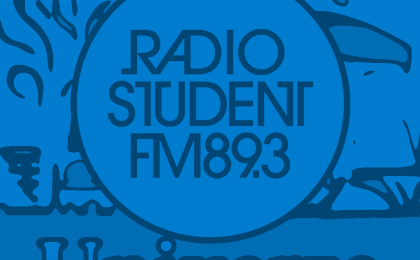
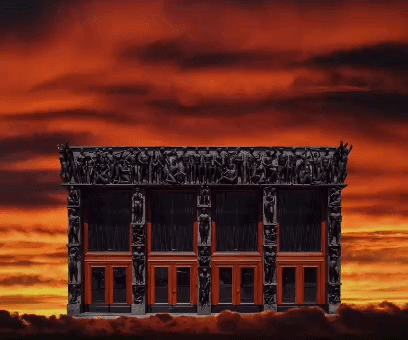


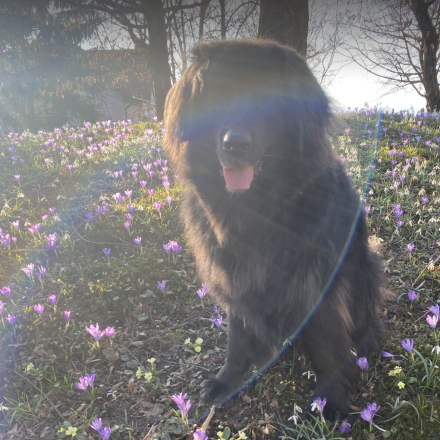

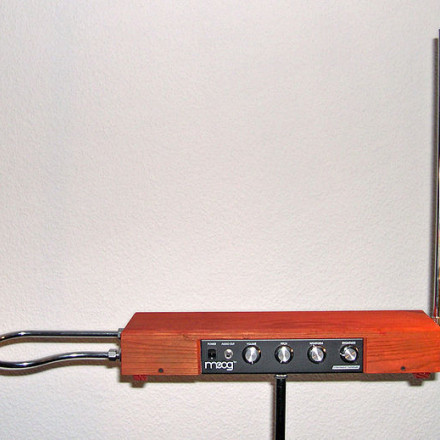
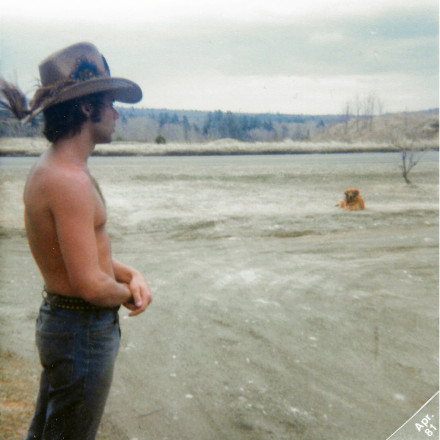
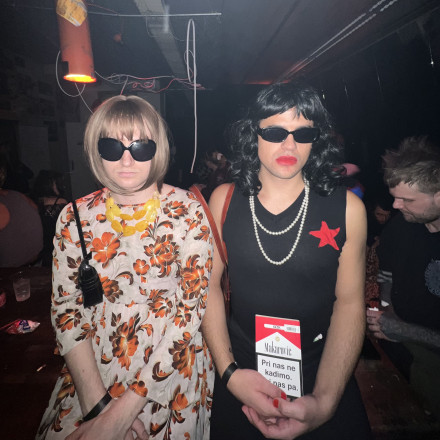
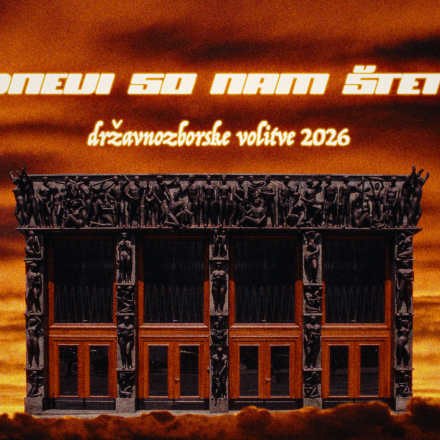
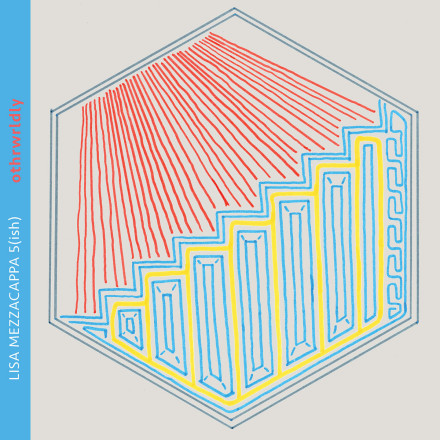
Dodaj komentar
Komentiraj